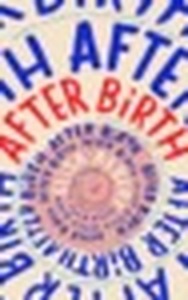
Ha ha ha ha ha. Ha ha ha ha ha ha!
Yeah, he says finally. I think a lot of women go through that.
What, abandon their dissertations?
Lose their minds. Having a kid.
It’s a year now since Walker was born, and Ari is still struggling. Most days, the baby goes to a childminder so she can go through the motions of working on her dissertation, about how feminist organisations implode (p46) and even her supervisor is beginning to see through the façade (p22):
There’s a curt email from Marianne about the dissertation. How is the thinking coming?
… Does Marianne actually think I’m working on my dissertation? Does she think I give a flying fuck about my dissertation? It’s all I can do to bathe occasionally, keep the house reasonably tidy, feed us, launder, get some sleep …
So the dissertation thing is pretty much a lie. You need an identity, some interest and occupation outside of having a kid, you just do. Otherwise the kid has to be your sole interest and occupation, and we all know how that works out for everyone.
Her partner, Paul, busy at work, Ari is lonely, exhausted and isolated (p55):
It’s always that way with periods of crisis: people you expect and want to be there for you are incapable and/or unwilling, and others you never imagined would be there for you show up with exactly what you need, exactly how you need it. And there is almost no way, alas, no way at all, to predict which people will be which.
Crispin and Jerry, the friends she’s relied on, having upped sticks to Europe, Ari retreats into herself, masking her despair with a veneer of angry cynicism. She’s impatient with the group of mothers who like her, have had surgical deliveries (p24-5); finds the earth-mother types of another group “a chore” (p27). She equates her father and his wife’s identification with grandparenthood to their identification with their Jewish heritage (p38-9):
They relish grandparenthood, or some projection of grandparenthood, like they relish a shortlist of life’s offerings: fundraisers of every stripe, anything to do with the Holocaust, whatever’s showing at the Jewish Museum, grossly overdressing for rousing High Holiday sermons in which they are beseeched to solve world Jewry’s problems, past and present, by sending money to Israel and voting Republican if it comes down to it.
I wonder if she’d be equally dismissive of Rebecca’s photographs of domestic disorder that have made her a feminist icon in Still Life with Bread Crumbs (or find solidarity in the problem of the raccoon in the attic – although Ari’s turns out to be only a squirrel).
So cynical is she, I doubt she’d appreciate my linking her current difficulties to ambivalence about her own mother, a cold and angry “bitch from hell” (p48) who died of cancer (triggered by “a lady-specific medical drug” (p44) her own mother had taken to prevent miscarriage) when Ari was twelve. Even when I acknowledge the sociopolitical factors – the conspiracy of silence around the trauma of childbirth and the failure of capitalism to accommodate the conflicting motivations of mothers to be everything to their babies while needing to keep their place in the adult world of work – I could imagine her rolling her eyes. Like Anna Bentz in Hausfrau, (my review coming soon but see here Clare O’Dea’s) the more alienated the lack of the right kind of support makes her, the less amenable she’d be to any kind of help.
Yet Ari is not completely devoid of hope. She looks for her salvation, not like Anna in sex, but in sisterhood, when she develops an obsession with the pregnant woman who is renting her friends’ house. It works for a while, Elisa saving herself through saving Mina (to the extent of breastfeeding Mina’s baby when Mina herself is struggling with the technique – not sure if that would be classed as a spoiler, except that it was an article on that very subject that first drew my attention to the novel).
I imagine that After Birth is the kind of novel that would divide readers. There’s a lot of anger and not a great deal of plot and, at times, Ari seems to drift towards (for perfectly valid reasons) self-pity. But in the end, I wanted to applaud her quest for authenticity, her willingness to expose uncomfortable truths. As she says of a childhood friend she admired, Ari doesn’t employ “some manufactured version of herself as full-time press agent for the real self” (p146), not caring who she might offend in reclaiming the word motherfucker for the abuse of women’s bodies in general and in the over-medicalisation of childbirth in particular. Each time I read something that made me feel uncomfortable, I was reminded of the research that suggests that we are actually more, not less, realistic when we are depressed.
Not all of us will be mothers, but we’ve all had mothers, and the well-being or otherwise of our mothers in those early years impacts significantly on our own sense of a secure place in the world. In the end, in advocating for mothers, Ari is advocating for babies (p188):
These tiny people, they’re not about you. They are not for you. They do not belong to you. They’re under your care, is all, and it’s your job to work at being a decent human being, love them well and a lot, don’t put your problems on them, don’t make your problems their problems, don’t use them to occupy empty parts of yourself.
In advocating for babies, she is advocating for the future of us all. Thank you Chatto and Windus for my review copy. Now, let’s hear what you think!





















 RSS Feed
RSS Feed





















